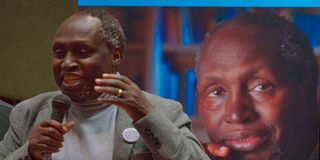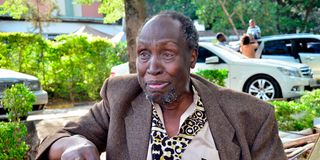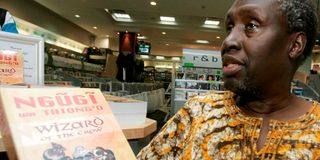Premium
How ‘The River Between’ shaped a generation of new Kenyan readers in schools

Author, playwright and critic Ngugi wa Thiong'o addresses fans on June 13, 2015 during a book signing to celebrate the golden jubilee of his first book 'Weep Not Child' in the Kenyan capital, Nairobi.
As news of the passing of literary icon Ngũgĩ wa Thiong’o slowly sinks in, much of the world is, understandably, reflecting on his remarkable writing and prolific career. But there is a special group of young people, who may not recall him through grand literary accolades, or know why he never won the Nobel Prize in Literature — perhaps not even that he was once expected to.
For these readers, Ngũgĩ holds a different kind of significance, rooted in one book: The River Between. Many encountered it not by choice, but because it was a required secondary school set book, ending its most recent appearance in 2012. Yet, through it, they unknowingly met Kenya’s most celebrated writer. The novel was first published in 1965 as part of Heinemann publisher’s African Writers Series.
Ngũgĩ wa Thiong’o’s death was announced on May 28, 2025. As the newsroom scrambled for the big tributes, I turned to my age mates — to remember Ngũgĩ not just as a literary giant, but as a quiet force in the shaping of our worldviews.
Sam Dennis Otieno, a Comparative Literature and African studies PhD candidate at the Pennsylvania State University in the United States, was doom scrolling on his Instagram page when he saw Mukoma wa Ngũgĩ’s post announcing his father’s death.
“My immediate feeling was a sense of vulnerability at the loss of a ‘father figure’ of sorts. For those of us – Kenyans, and East Africans – who study literature, Ngũgĩ was the giant upon whose shoulders we stood for a long time. He was our claim-for-fame in the broader field of African literature and decolonial studies,” he said.

Renowned author Ngugi wa Thiong'o during an interview on February 7, 2019.
Just like Sam, most of my interviewees learned about the passing of Ngũgĩ wa Thiong’o while scrolling through social media. But because of the magnitude of the news, they had to confirm the information through trusted news channels such as the Nation.
When I asked Sam what his impression of The River Between was back when he studied it as a secondary school set book, he said he just needed to master the book to pass exams.
“The novel was an introduction to many conflicts that continue to shape our world. For a young mind in high school, I couldn’t unpack the complexities of the novel but as I grew older the questions the novel raises stay with me. The world is a complicated space, and addictions to binary positions will not solve the challenges constantly thrown at us. We need to at least try to navigate the river between; we may not be as skilful at this, but we can make effort. Ngũgĩ pointed the way, it is our responsibility to walk it,” Sam says.
Farida Musa, a mentor and facilitator for Adolescent Girls and Young Women, says studying the book in high school has had an enduring impact on her life.
“At first The River Between was just a book I needed to read to pass my exams. However, my teacher of English was good at narrations and explaining the book. This made the sessions fun and engaging and the more we analysed the book the better I understood how hard it is to change a society’s mindset from its traditions, beliefs and faith,” she says.
Khalibitsi Lukote, a teacher in Western Kenya, says The River Between has been defining in the way that she makes sense of the role of conflict in the society.
“The book highlights the delicate balance between embracing progress and preserving cultural identities, something many nations and societies grapple with. It reminds us of the struggles of the past that continue to echo in the present day conversations on governance, education and belonging,” she says.
Even before encountering The River Between in class, Billy Onyango had always been a reader. However, it was after he sat through classes analysing literature books in high school that he appreciated the depths of the lessons carried in books. The River Between taught him to look beyond the surface of social issues, and to think critically about the forces behind them.
“I was drawn by how the book reflected Kenyan colonial history and society in a captivating way. Ngũgĩ’s storytelling in that book was powerful and unforgettable. I came to see literature as a tool that can teach us lessons even history classes might miss, especially about the issues young people face every day,” Billy says.

Kenyan author Ngugi Wa Thiong'o shows his book "Wizard of the Crow" during an interview with Reuters at a bookshop in downtown Nairobi on January 16, 2007.
When Esther Musembi met Ngũgĩ wa Thiong’o face to face, she couldn’t speak for the first few minutes because she was awestruck. This is the moment her mind went to when she learned about his death.
“My teacher of literature invited him to school and we did a small enactment of a scene. I was Nyambura and seeing Ngũgĩ’s face light up during that moment was priceless (though I couldn't speak for a few minutes, we spoke later),” Esther says.
Like Billy, Boera describes herself as a reader. The influence of the book was so powerful, it made her drop her English name because the book made her question identity intensely.
“When I was in high school, I read the book as a Kenyan love story. I read the book many times! Interestingly, my mother read the same book when she was a student and chatting about that book with her every so often was a memorable way for us to bond,” she says.
Did you read The River Between in high school? What still lives with you today, even as the world bids Ngugi wa Thiong’o goodbye?
Read --> Ngugi wa Thiong’o: Life and Times
You may also check out this one --> World mourns as Ngugi turns into ‘a grain of wheat’


